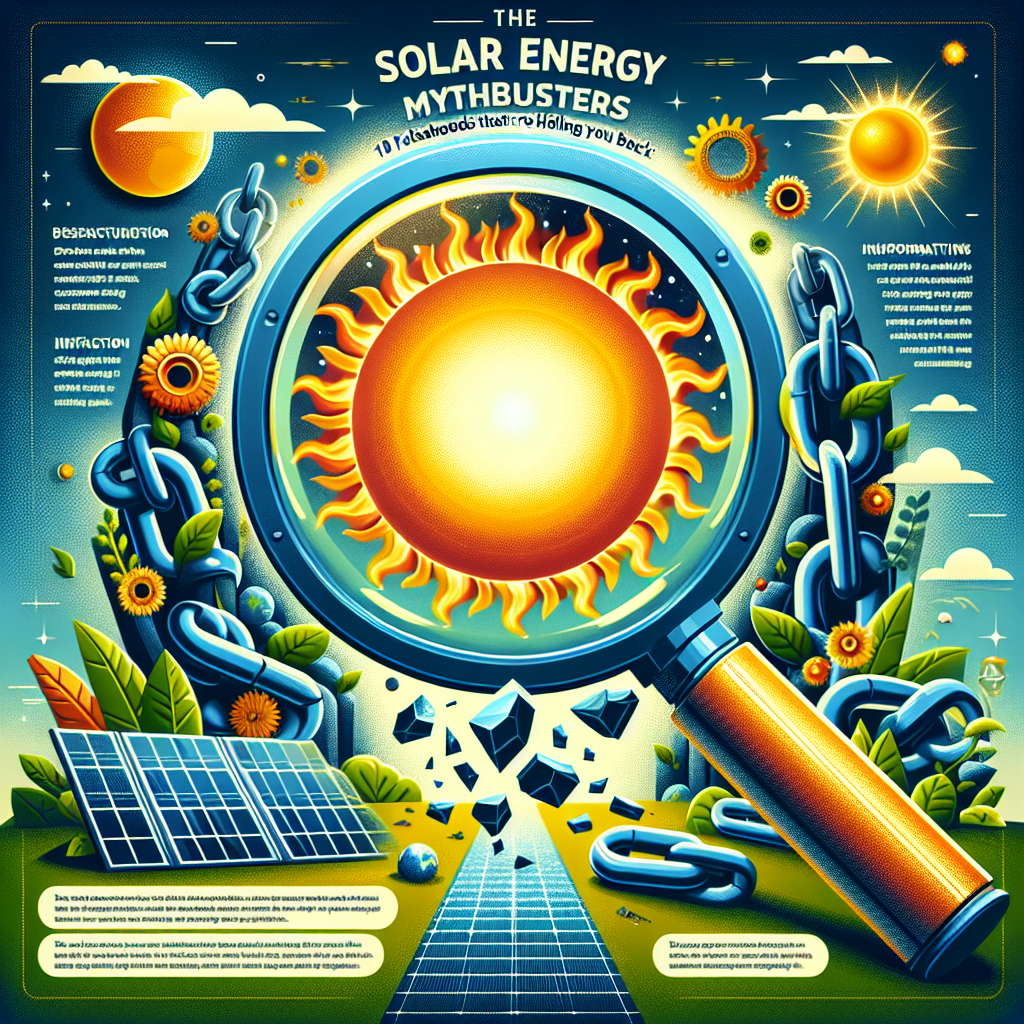As the world shifts towards more sustainable energy sources, solar energy has emerged as a leading contender in the fight against climate change. However, despite its benefits and increasing popularity, numerous misconceptions continue to deter people from making the switch to solar power. In this article, we will debunk ten common myths about solar energy, helping you to better understand its potential and encouraging a greener tomorrow.
Myth 1: Solar Panels Are Too Expensive
One of the biggest misconceptions about solar energy is that it’s prohibitively expensive. While the initial investment can be substantial, the cost of solar panels has dropped significantly over the years. In fact, according to the Solar Energy Industries Association (SEIA), the cost of solar has decreased by over 70% since 2010. With available tax credits, rebates, and financing options, going solar can be more affordable than you might think.
Myth 2: Solar Energy Only Works in Sunny Climates
Many believe that solar energy is only effective in sunny regions, leading people in cloudier climates to shy away from this renewable resource. However, solar panels can still generate electricity on cloudy days, as they capture both direct and diffuse sunlight. Countries like Germany, known for its grey skies, are leaders in solar energy production, showcasing that solar panels are efficient in various weather conditions.
Myth 3: Solar Panels Require Constant Maintenance
While it’s true that solar panels need occasional maintenance, the reality is far less daunting. Most solar panel systems are designed to be low-maintenance and durable. A simple cleaning once or twice a year, along with regular inspections, is usually sufficient. Additionally, many manufacturers offer warranties of 25 years or more, ensuring you a reliable energy source for decades.
Myth 4: Only Homeowners Can Benefit from Solar Energy
Many people think solar energy is exclusively for homeowners, but that’s simply not the case. Renters can also benefit through community solar programs that allow them to subscribe to a shared solar array. This means you can tap into solar power without needing to install panels on your own property.
Myth 5: Solar Energy Production Is Not Reliable
A common concern is that solar energy isn’t a reliable source of power due to its dependence on sunlight. However, technological advancements in energy storage, such as batteries, have made it possible to store excess energy generated during the day for use at night or during cloudy weather. Additionally, combining solar power with other energy sources can create a more robust and dependable energy system.
Myth 6: Solar Panels Are Inefficient
Efficiency is often cited as a reason against solar energy, but the truth is that modern solar panels are more efficient than ever. Most panels convert around 15-20% of sunlight into usable electricity. Furthermore, technological advancements continue to enhance solar efficiency, making them a viable energy option for different applications.
Myth 7: Solar Energy Has a High Carbon Footprint
While it’s true that the manufacturing process for solar panels involves some carbon emissions, the overall lifecycle emissions of solar energy are significantly lower than fossil fuels. In fact, solar power can reduce greenhouse gas emissions by 80% or more when replacing traditional energy sources. The environmental benefits far outweigh the initial footprint of production.
Myth 8: You Need a Special Roof for Solar Panels
Many assume that only specific types of roofs can accommodate solar panels, but that’s a misconception. While certain roof types — such as those facing south with minimal shading — are ideal, solar panels can still be installed on a wide variety of roofs. Even flat roofs and those made of different materials can support solar systems with the right design.
Myth 9: Solar Energy Is Only for the Wealthy
The narrative that solar energy is only for affluent households is misleading. Many programs are in place to help lower-income families gain access to solar technology. Numerous states offer incentives and subsidies to help make solar energy accessible to everyone, ensuring that the benefits of this renewable resource can be enjoyed by all socioeconomic groups.
Myth 10: Switching to Solar Is Too Complicated
Finally, many people shy away from solar energy simply due to the perceived complexity of the process involved in switching. However, most solar providers offer a streamlined experience, guiding you through the steps from consultation to installation. Resources are readily available to help homeowners understand the process, costs, and long-term benefits, making the transition as smooth as possible.
Conclusion: Overcoming Solar Energy Myths
Understanding the truth behind these common myths can empower you to make informed decisions about energy usage. By debunking these falsehoods, you can see that solar energy is indeed a viable, efficient, and accessible option for reducing your carbon footprint and saving on energy costs. The road to a more sustainable future starts with knowledge, so embrace solar power and take a confident step toward a cleaner, greener planet.
Call to Action
Ready to explore solar energy for your home? Contact us today for a free consultation to see if solar power is the right choice for you!


